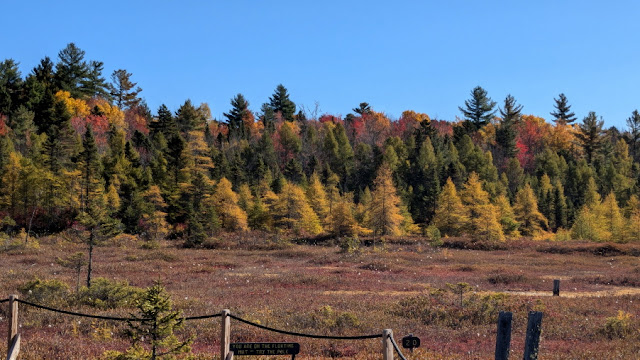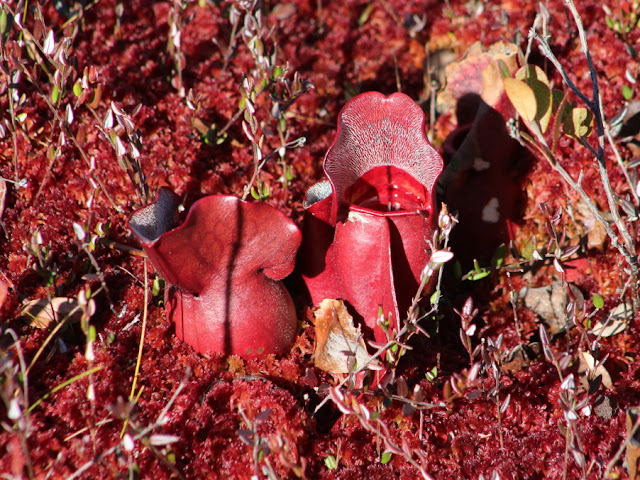A quick refresher on the bog's history: It started as a lake over 15,000 years ago when the continental ice sheet deposited a huge chunk of ice that sunk into the earth and created a pond as it melted. 150 years ago it was still a pond that people fished in, but today the pond is completely covered by a floating peat bog. As you walk across the bog you are suspended above the hidden lake by the floating mat of moss. There's a pole beside the boardwalk that you can pull up and see that the water below your feet is over ten feet deep.
Once an insect lands on its slippery cup it slides down past downward facing hairs into the bottom of the cup which contains water and the plant's digestive juices.
I looked them up to identify them and found that they also are part of the Pitcher Plant - it's their seed pod.
 |
| A Pitcher Plant seed pod. |
All that red throughout the bog is the thick layer of Sphagnum Moss that has formed over many years.
Some of it is grounded while much of it is floating on the pond. Over time the moss will decay and eventually become peat.
 |
| Sphagnum moss working its way towards peat. |
Along the board walk we noticed a plant that looked like rosemary.
Looking into this one I learned it's called Bog Rosemary though it's not related to the herb rosemary. Bog Rosemary is in the heath family, and is in fact toxic, containing andromedotoxins which can cause breathing problems among other health issues.
Plants in the heath-family are generally well suited to the acidic, low nutrient soils of bogs, and another heath plant abundant at the bog is Leatherleaf, which is also prevalent around Lake Wicwas. Other plants found at both Wicwas and the Philbrick Bog include cranberry and blueberry. Something Wicwas doesn't have is Tamarack which is a tree prevalent all around the Philbrick Bog.
 |
| Tamarack |
Tamarack is considered a deciduous conifer, unusual in that it loses its needles in the fall which is why they are a nice yellow-green color right now.
Back at Lake Wicwas it's a quiet time of year. We toured the lake yesterday on a gorgeous October day and saw no loons, herons, osprey, or eagles, just a dozen mallards enjoying a nice rest day on their trip south.
I hope you're able to enjoy this fine New England weather wherever you are!













Scott. I noticed a talk given by Dean Dexter about "The Smiths of Wicwas Lodge" while I was in Meredith. Is there a story here? Thanks. Mike Sayles saylesman1@gmail.com
ReplyDeleteVery nice piece on Criscenti’s Bog. Fascinating biology. We love going there. Mid summer it is home to two beautiful orchids, Calopogon and White Fringed Bog Orchid
ReplyDelete